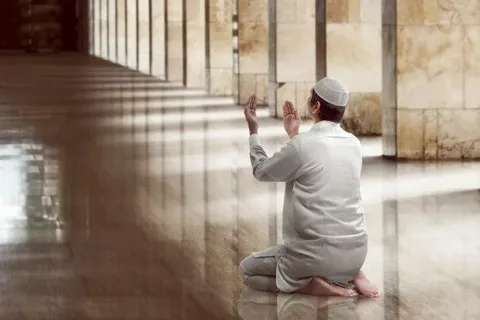Prayer is one of the core pillars of Islam and an essential act of worship for Muslims around the world. For Muslims, prayer, or Salah, represents a direct connection to Allah, a way to cultivate gratitude, patience, and spiritual growth. But what does the Quran say about prayer? What guidance does it provide on how and why Muslims should pray? Let’s dive deeper into the teachings of the Quran regarding Salah, its significance, and how it shapes the life of a believer.
What is Prayer (Salah) in Islam?

Prayer In Islam, the term Salah refers to the formal, structured prayer performed by Muslims five times a day. This prayer is a physical, mental, and spiritual act of worship where Muslims stand before Allah, recite specific verses from the Quran, and perform prescribed movements. It’s distinct from Du’a, which is a personal supplication or plea to Allah, often made outside of the formal structure of Salah.
Importance of Prayer in the Quran
The Quran emphasizes the importance of Salah repeatedly, making it clear that prayer is not just a recommendation but an obligation for every Muslim. One of the most prominent verses regarding prayer is:
“Establish the prayer, for prayer restrains from shameful and unjust deeds.” (Quran 29:45)
This verse highlights that prayer is not only a ritual act but also a moral compass that keeps a believer away from wrongdoing. The Quran mentions the command to pray in multiple places, stressing that it’s a key part of Islamic worship.
Five Daily Prayers in Islam

The Quran outlines the importance of regular, timely prayer through the establishment of five daily prayers:
- Fajr – Before dawn
- Dhuhr – Midday
- Asr – Afternoon
- Maghrib – After sunset
- Isha – Night
Each of these prayers is strategically placed throughout the day, helping Muslims maintain a close relationship with Allah, no matter how busy life gets.
Conditions for Offering Prayer
Before a Muslim can engage in prayer, there are several conditions they must meet. The Quran mentions these prerequisites to ensure the sanctity and purity of the act:
- Cleanliness (Wudu): Physical purity is a significant aspect of preparing for prayer. Muslims must perform ablution (wudu) before praying to cleanse themselves spiritually and physically.
- Facing the Qibla (Kaaba): Muslims are required to face the Kaaba in Mecca while performing their prayer, symbolizing unity and direction in worship.
- Intention (Niyyah): Prayer should be offered with a sincere heart and the intention to worship Allah. The internal intention holds as much importance as the physical actions.
How to Pray: A Step-by-Step Guide
While the structure of prayer may seem complicated to a newcomer, it follows a specific sequence of movements and recitations. Each prayer consists of units called Rak’ahs, and during each unit, Muslims stand, bow, prostrate, and sit while reciting verses from the Quran, including the opening chapter (Surah Al-Fatiha).
what does the quran say about prayer
There are several significant verses in the Quran that emphasize the importance of Salah, some of which include:
“Verily, I am Allah: There is no god but I: So serve Me, and establish regular prayer for My remembrance.” (Quran 20:14)
This verse underlines the relationship between prayer and remembering Allah, showing that prayer serves as a reminder to stay connected with the Creator.
Prayer as a Source of Patience and Strength
The Quran teaches that prayer is not just a ritual but a means to attain patience and strength, particularly during times of hardship. One key verse states:
“O you who have believed, seek help through patience and prayer. Indeed, Allah is with the patient.” (Quran 2:153)
Here, the Quran encourages believers to turn to prayer when faced with life’s challenges, reminding them that Allah provides strength to the patient.
Prayer in Community (Congregational Prayer)
Praying together as a community, especially in mosques, is highly encouraged in Islam. The Quran highlights the unity and shared spiritual benefit of congregational prayer:
“And bow down your heads with those who bow down (in worship).” (Quran 2:43)
This verse shows the importance of collective worship, helping to foster a sense of community and shared faith.
Night Prayers (Tahajjud)
Night prayers, particularly Tahajjud prayer, are highly recommended in the Quran. Although not obligatory, this prayer holds immense reward:
“And during a part of the night, pray Tahajjud beyond what is obligatory for you; perhaps your Lord will raise you to a praised position.” (Quran 17:79)
This highlights the spiritual elevation that comes with extra voluntary prayers.
Friday Prayers (Jumu’ah)
The Quran dedicates a specific mention to the Friday (Jumu’ah) prayer, an important congregational prayer held every Friday:
“O you who have believed, when [the adhan] is called for the prayer on the day of Jumu’ah [Friday], then proceed to the remembrance of Allah and leave trade.” (Quran 62:9)
This verse emphasizes the importance of setting aside worldly affairs to focus on worship on Fridays.
Prayer for Forgiveness and Guidance
Prayer is also a way for Muslims to seek forgiveness and guidance from Allah. The Quran provides many supplications for personal growth and community well-being:
“Our Lord, forgive us and our brothers who preceded us in faith.” (Quran 59:10)
This verse encourages prayers for both personal forgiveness and the well-being of others.
The Role of Prayer in Building Taqwa (God-consciousness)
Salah helps cultivate Taqwa, or God-consciousness. Through regular prayer, Muslims remain mindful of Allah, leading them to make better choices in life:
“Establish prayer to remember Me.” (Quran 20:14)
This connection between prayer and remembrance of Allah helps develop a deeper sense of mindfulness.
Quranic Stories Highlighting Prayer
The Quran includes stories of prophets who were devoted to prayer. For instance, the prophet Ibrahim (Abraham) prayed for the establishment of Salah in his progeny, demonstrating the importance of passing down this practice.
“My Lord, make me an establisher of prayer, and many from my descendants.” (Quran 14:40)
These stories offer valuable lessons about perseverance, patience, and faith.
FAQs
What does the Quran say about the timing of prayer?
The Quran stresses the importance of praying at specific times throughout the day, as mentioned in Quran 4:103: Indeed, prayer has been decreed upon the believers a decree of specified times.
Why is cleanliness important before prayer?
Cleanliness is essential as it symbolizes both physical and spiritual purity. The Quran emphasizes the need to perform Wudu (ablution) before prayer in Quran 5:6.
What is the difference between obligatory and voluntary prayers?
Obligatory prayers are the five daily prayers required of every Muslim, while voluntary prayers, such as Tahajjud, are recommended but not mandatory.
Can you pray anywhere, or are there specific places mentioned in the Quran?
While prayer can be performed anywhere clean, the Quran encourages praying in mosques (Quran 9:18) as it fosters a sense of community.
How does prayer help in times of hardship according to the Quran?
The Quran encourages believers to seek help through prayer and patience, especially during hardships, as stated in Quran 2:153.
Conclusion
The Quran provides profound guidance on prayer, outlining its importance in building a Muslim’s faith, cultivating patience, and fostering a close connection with Allah. By adhering to the teachings of Salah, Muslims not only fulfill their religious obligations but also enhance their spiritual well-being.


